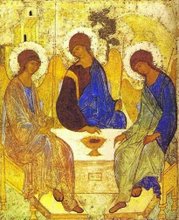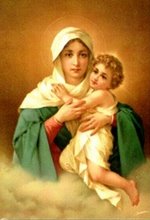God is One and Three: he is not an eternal solitude; rather, he is an
eternal love that is based on the reciprocity of the Persons, a love that is the
first cause, the origin, and the foundation of all being and of every form of
life. Unity engendered by love, trinitarian unity, is a unity infinitely more profound
than the unity of a building stone, indivisible as that may be from a material
perspective.This supreme unity is not rigidly static; it is love. The most
beautiful artistic depiction of this mystery was left to us by Andrei Rublev in
the fifteenth century: the world-renowned icon of the Trinity. Of course, it
does not portray the eternal mystery of God in himself, who would dare to do
that? It attempts, rather, to represent this mystery as it is reflected in the
gift of itself in history, as in the visit of the three men to Abraham by the
oaks of Mamre (Gen 18:1-33). Abraham immediately recognized that they were not
just like any other men, but that God himself was coming to him through them.In
Rublev's icon, the mystery of this event is made visible, presented as an event
that can be contemplated in its many dimensions: thus the mystery as such is
respected. The artistic richness of this icon allows me to underscore another
characteristic: the natural surroundings of this event, which express the
mystery of the Persons. We are near the oaks of Mamre, which Rublev depicts in
stylized form as a single tree representing the tree of life; and this tree of
life is none other than the trinitarian love that created the world, sustains
it, saves it, and is the source of all life. We see also the tent, the dwelling
of Abraham, which recalls the Prologue of John's Gospel: "And the Word became
flesh and dwelt among us" (Jn 1:14).The body of the incarnate Word of God became
itself the tent, the place where God dwells: God becomes our refuge and our
dwelling place. Finally, the gift that Abraham offers, "a calf, tender and
good", is replaced, in the icon, with a cup, a symbol of the Eucharist, a sign
of the gift in which God gives himself: "Love, sacrifice, and self-immolation
preceded the act by which the world was created and are the source of that
creation." [1] The tree, the tent, and the cup: these elements show us the
mystery of God, allow us to immerse ourselves in the contemplation of its
intimate depths, in his trinitarian love. This is the God that we celebrate.
This is the God who gives us joy. He is the true hope of our world. Amen.
Monday, June 4, 2007
Faith in the Triune God
On the occasion of the Feast of Most Holy Trinity I would like to propose this reflection given about the Triune God in 2004. It concludes with a point on Lublev Icon:
Labels:
Agape,
Holy Spirit,
Holy Trinity
Subscribe to:
Post Comments (Atom)




No comments:
Post a Comment